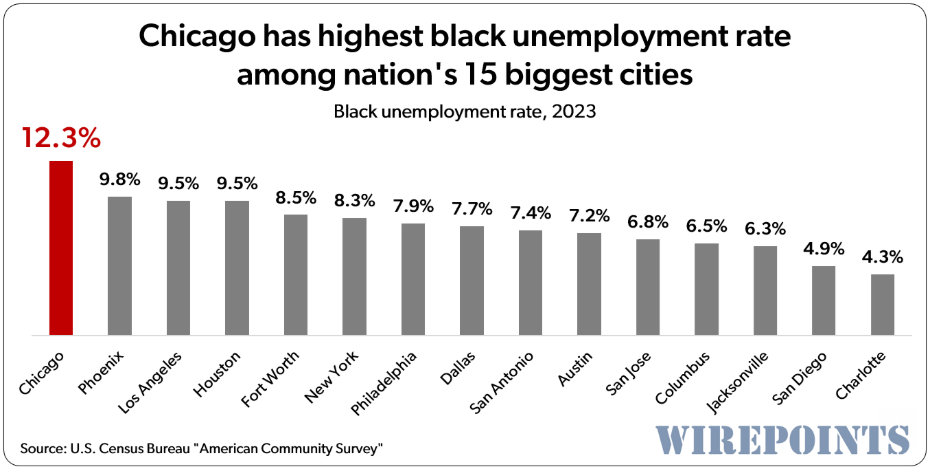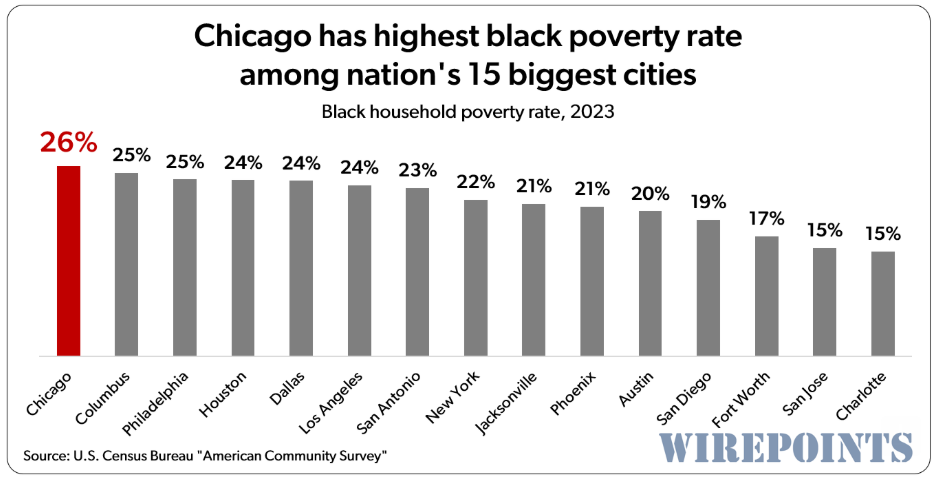From Wirepoints:
Create jobs and opportunity
If Illinois and Chicago politicians really cared about improving the lives of black Chicagoans, they’d obsess about jobs, investment and economic growth.
Unfortunately, their policies have made a mess instead.
In preparation for my Chicago Tonight’s Black Voices appearance last week, I pulled together several key facts on how Chicago blacks were fairing vs. the nation’s other big cities. The data is dismal.
Chicago is stuck in a vicious spiral, where too much spending has led to too much debt, including massive pension debts. Taxes, as a result, have become increasingly punitive. Pile on top of that failing schools and crime, and that’s chased out people and businesses, driving down job creation and investment. Based on the data, minorities are paying a big price relative to their peers.
At the core of Chicago’s failure is a lack of economic growth. The metro area’s GDP, after adjusting for inflation, has grown only 4% since 2019. That’s the worst economic growth among the nation’s 15 largest metro areas.

It’s quite the opposite for cities with pro-growth, pro-business policies. The economies of booming metros like Dallas, Seattle, Miami and Phoenix have all grown 17% or more. That’s more than four times the growth rate of Chicago.
Unsurprisingly, jobs are a problem. At 12.3%, Chicago’s black unemployment rate was the highest among the nation’s 15 biggest cities, according to the latest data from the U.S. Census Bureau.
Jacksonville’s black jobless rate was half that of Chicago’s, and Charlotte’s was just a third.

A less dynamic economy also means lower paying jobs. The median income for black households in Chicago is just $44,413 after adjusting for cost of living. That’s the third-lowest amount among big cities.
Chicago’s black poverty rate also leads among the nation’s 15 biggest cities. Over 26% of black Chicagoans are below the poverty line – nearly 200,000 people.

Despite the above data, my fellow panelists on the Chicago Tonight show called for even more spending and tax hikes – billions more – in the 2026 Illinois budget in the name of supporting the black community.
Chicagoans need the opposite. Instead of more spending and the tax hikes that go with it, lawmakers need to obsess about jobs, investment and economic growth.
Businesses and investment will only return when lawmakers tackle what makes the city so costly. Its massive $53 billion in pension debts need major reform. Chicago Public Schools can bring down its $30,000 per student spend by closing near-empty schools and cutting back on its bloated bureaucracy. The city’s transit agencies need to stop running near-empty trains and buses and instead right-size their operations. And the public unions, in particular the teachers union, need to be de-powered.
The problem is that our current leaders wear as a badge of pride how many people they can get on Medicaid and food stamps. They ignore the fact that people, no matter their color, can’t thrive without good jobs and good pay.
Illinois needs a new set of lawmakers that will prioritize economic growth over government dependency.

Blacks Doing Worst in Chicago | Dailywise
[…] Story continues […]